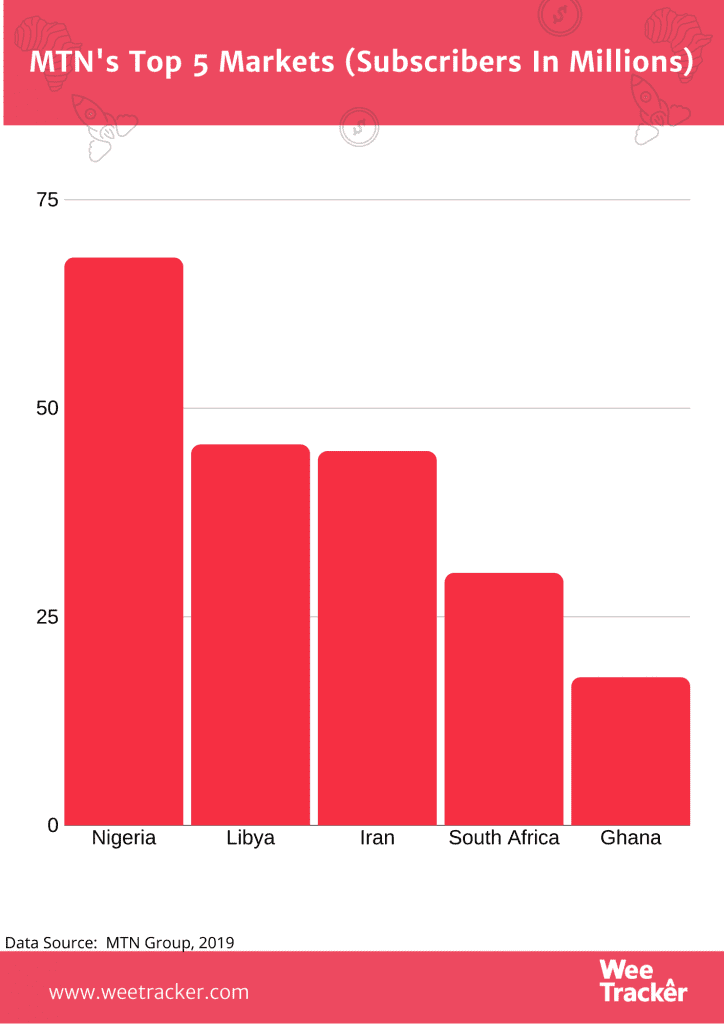Africa’s Largest Telco Is Still Caught In A Lingering Anti-Terrorism Suit

“Y’ello Problemo”
It was the last Friday of last year when a lawsuit was officially filed against a number of firms including Africa’s largest telco, MTN Group, in the United States District Court for the District of Columbia.
The plaintiffs in the pending lawsuit are 385 Americans, including dozens of veterans and members of Gold Star Families.
Gold Star Families is a United States-based organisation founded in January 2005 by individuals who lost family members in the Iraq War, and are thus entitled to display a Gold Star.
The lawsuit before the Federal Court alleges that MTN Group, along with DAI Global, Louis Berger Group, G4S Risk Management, Centerra Group, and Black & Veatch Special Projects Corp., violated the Anti-Terrorism Act by paying off terrorists in Afghanistan.
The pending litigation also alleges that those companies implicitly enabled terrorism, by extension.
The plaintiffs are family members of U.S. service members who were killed or wounded in Afghanistan. They are seeking damages, not necessarily with the admission of guilt.
The defendants are prominent contractors that worked to rebuild Afghanistan post-invasion. These companies are accused of funneling millions of dollars in payments to the Taliban for protection that funded the group’s attacks on American troops in the region.
On its part, MTN Group is being accused of not only making payments to Taliban guards between 2009 and 2017 to ensure the protection of some of its facilities and installations in the conflict-ridden country but also allegedly deactivating its cellular network at night at the Taliban’s request.
How MTN Is Responding
Three days after the anti-terrorism lawsuit became public knowledge, MTN Group — which had until then been mute on the topic — said it was “reviewing the allegations” while maintaining that it “conducts its business in a responsible and compliant manner in all its territories.”
And that was pretty much it. No further word was heard, until some four months later.
April 2020 was winding down when the South African multinational telecommunications giant announced that it had filed a “motion to dismiss.” WeeTracker reached out to MTN Group to learn about its latest stance on the matter and this is what we gathered:
“Our filing, which is known as a “motion to dismiss” seeks to terminate the lawsuit because the court lacks jurisdiction over MTN and because the claimants do not allege conduct by MTN that would have violated the U.S. Anti-Terrorism Act,” a spokesperson for MTN told us.
“As reflected in the court filing we made, we intend to defend our position, and we believe that the case should be dismissed. We remain of the view that we conduct our business in a responsible and compliant manner in all our territories.”
In a separate document which the company shared with WeeTracker, MTN says “the plaintiffs have sued the wrong defendants in the wrong court based on insufficient allegations.”
MTN’s motion to dismiss appears to be tied to technicalities rather than actual evidence disproving the factual allegations on which the case is built upon.
The allegations in the lawsuit are based on what lawyers for the service members’ families describe as confidential witnesses, as well as internal company documents, declassified intelligence, congressional testimony and reports, and press accounts.
The telco says it took the technical route because it is working according to U.S. law and procedures which dictate that MTN cannot challenge the specific factual allegations made against the company at this stage of the lawsuit.
Hence, the decision to tether its motion to dismiss on lack of jurisdiction (since it does not operate in the United States) and the legal insufficiency of the claims (as it claims the lawsuit does not allege any conduct by MTN that would have violated the Anti-Terrorism Act).
“We cannot comment on the litigation beyond what we have already shared, given that the matter is before the courts. MTN conducts itself as a responsible citizen in the communities in which it operates and takes compliance with all of the laws of the jurisdictions in which it operates seriously,” the company’s spokesperson told us.
Where Things Stand
The MTN Afghanistan subsidiary was established in mid-2007 after MTN Group acquired Areeba which had 200,000 subscribers as of 2006.
The acquisition was part of a USD 5.53 Bn global merger between the two companies. MTN is the majority shareholder, owning as much as 90 percent of the company, while the International Finance Corporation (IFC), at 9 percent, is also a debt and equity shareholder in MTN Afghanistan which now has more than 6.2 million subscribers and generates over USD 8.3 Mn in annual revenue.

Currently, MTN is active in 20+ countries, though one-third of the company’s revenue comes from Nigeria, where it holds about 38 percent market share.
No stranger to controversy, MTN has previously tussled with authorities over some of its dealings in Iran, Turkey, and its largest market, Nigeria. Some of those back-and-forths involved litigations, allegations, fines, and mediation.
The latest court case is, thus, not exactly a one-off. WeeTracker reached out to Gold Star Families to learn about their counter to MTN’s motion to dismiss, as well as their next move in the litigation process but numerous calls and messages have gone unanswered.
According to the rules, aiding and abetting terrorism whether explicitly or implicitly is a breach. In public statements for more than a decade, U.S. officials have opposed the practice of making payments to warlords and other corrupt groups, citing rules and regulations in place at the Department of Defense.
In 2009, then-Secretary of State, Hillary Clinton, told lawmakers that the “protection money” was “one of the major sources of funding for the Taliban.”
For now, though, the matter remains an active court case that is still in its early stages might eventually go to trial.
Featured Image Courtesy: BBC